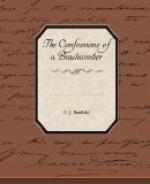Error was ingrained in the youthful days of middle-aged Australians. Their school-books told them in swinging rhyme that they lived in a world of undiscovered souls, that ’twas Heaven’s decree to have these lost souls brought forth; that man should assert his dignity and not allow “brutes” to look upon him. Discoveries are still being made. Heaven’s decree is replaced by the decree of wild talkers, the dignity of man is found to be the vanity of a paid politician, and but few of the “brutes” of Australia are left to look down upon anything. But there are some of saving grace who frankly acknowledge shame upon finding how little they really know of their native country.
Young Australians were once taught that Australian trees cast no shade—that the edges of the leaves were presented to the sun to avoid the heat of the cruel luminary; that Australian flowers had no scent, and Australian birds no song; that the stones of Australian cherries grew on the outside of the fruit, that the bees had no sting, and that the dogs did not bark. In those days a gentleman with a military title improved upon the then popular list of contradictions by asserting that in Australia the compass points to the south, the valleys are cold, the mountain-tops warm, the eagles are white, and so on. Many accordingly took their natural science as “Tomlinson” did his God—from a printed book—and that compiled in England. Until they began to investigate they were puzzled by contradictions. The first prompt bee-bite—there are many varieties of Australian bees, some pugnacious and pungent—diverted attention from the school-book romances. It was discovered that thousands of square miles of Australian soil never catch glimpses of the sun in consequence of the impenetrableness of the shade of Australian trees; that the scent of the wattles, the eucalypts, the boronias, the hoyas, the gardenias, the lotus, etc., etc., are among the sweetest and cleanest, most powerful and most varied in the world; that many of the birds of Australia have songs full of melody; that the so-called Australian cherry is no more a cherry than an acorn; that the Australian dog (though “the only true wild dog in the world”) is deemed to be a comparatively recent introduction—a new chum of Asiatic origin who entered the glorious constellation of the State something before the era of exclusive legislation—so naturally he does not bark, for barking is an evidence of civilisation; but he soon learns the universal language of the dog.
Many years ago most of this gross and superficial ignorance was brushed away here, though now and again evidence crops up that a good deal yet adheres in the old country. Australian school-books of the present day contain so much that is grossly false and misleading of the natural conditions of certain portions of the Commonwealth as to leave no room to doubt the present duty. We are continually making mutually beneficial discoveries, and may it be granted




